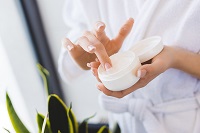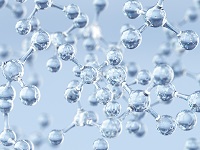Dry skin and moisturizers: Everything you need to know
 In winter time and early spring everyone’s skin is dry, cracked and flaky. Because of this “xerosis”, fine lines and wrinkles look more noticeable. The skin is your body’s largest organ and it represents the first line of defense against bacteria, viruses, and irritants. If that skin barrier function is disrupted, even by simple dry skin, that puts our patients at risk for infection and dermatitis.
In winter time and early spring everyone’s skin is dry, cracked and flaky. Because of this “xerosis”, fine lines and wrinkles look more noticeable. The skin is your body’s largest organ and it represents the first line of defense against bacteria, viruses, and irritants. If that skin barrier function is disrupted, even by simple dry skin, that puts our patients at risk for infection and dermatitis.
Knowing how your skin become dry and how moisturizers work to retain water will help you to keep your skin well hydrated yearlong.
How does our skin become dry?
We all lose up to a pint of water through our skin’s surface every day. This is called trans-epidermal water loss (TEWL). Some factors that increase the rate of trans-epidermal water loss include low humidity, sunburn, excessive exfoliation, exposure to irritants such as harsh soaps, alcohols or solvents, and exposure to highly chlorinated water. Common skin diseases like atopic dermatitis, psoriasis or ichthyosis can also increase trans-epidermal water loss. When the skin’s moisture level is less than 10%, it is technically considered dry skin.
There are 3 strategies to keep the skin well-hydrated:
1- Avoid excessive exposure to irritants which can strip the skin’s superficial layers and oils
2- Moisturize, moisturize, moisturize to help seal water in the skin
3- Use a humidifier to keep home humidity levels between 30-50%
How do moisturizing ingredients work?
Moisturizing ingredients work via three different mechanisms, and many moisturizing products combine these occlusive, emollient or humectant ingredients for better effect than any single ingredient can offer.
Occlusives
Occlusives create a barrier over the skin’s surface to stop transepidermal water loss. Examples of occlusives include petroleum jelly, Aquaphor ointment, shea butter, mineral oil, or coconut oil. These simple oils and waxes simply sit on the very surface layer of the skin, the stratum corneum, and create a barrier to prevent transepidermal water loss. Occlusives are very effective moisturizers, but users often cite stickiness and messiness as an impediment to using them.
Emollients
Emollients are creams, lotions or ointments which are able to penetrate beyond the stratum corneum into the deeper layers of the skin. They can help support and bind together the proteins that help hold the skin’s cells together, filling in the gaps between the cells and holding water deeper in the skin.
Humectants
 Humectants work a bit differently: instead of focusing on simply holding water in the skin, these ingredients work by drawing moisture in from the outside. Humectants penetrate the outer layer of the skin, pulling water molecules along with them. These ingredients increase the total amount of water that the skin can hold. Humectant ingredients include hyaluronic acid, glycolic acid, and urea. Special naturally occurring molecules within the skin such as ceramides, filaggrin, and pyrrolidone carboxylic acid (PCA) form the skin’s Natural Moisturizing Factor (NMF). These powerful humectants have been incorporated into commercially-available moisturizers to good effect.
Humectants work a bit differently: instead of focusing on simply holding water in the skin, these ingredients work by drawing moisture in from the outside. Humectants penetrate the outer layer of the skin, pulling water molecules along with them. These ingredients increase the total amount of water that the skin can hold. Humectant ingredients include hyaluronic acid, glycolic acid, and urea. Special naturally occurring molecules within the skin such as ceramides, filaggrin, and pyrrolidone carboxylic acid (PCA) form the skin’s Natural Moisturizing Factor (NMF). These powerful humectants have been incorporated into commercially-available moisturizers to good effect.
Humectants can be a double-edged sword: when the humidity is low in the surrounding air (such as in the wintertime), they can draw water molecules up from the deep dermis. If this deep dermal moisture is not replenished, the skin’s stratum corneum may be superficially hydrated in the short term, but ultimately may become more dry. Look for moisturizers that combine humectant ingredients with occlusive ingredients to solve this problem.
Moisturizers that combine all three types of ingredients are often the most effective. But as important as the ingredient list might be, it is even more important that the moisturizer feel good on the skin! A moisturizer that is easy to apply, glides onto the skin, and penetrates swiftly is one that is going to be easier to use every day. As long as you have no sensitivities, choosing a moisturizer with a fragrance you like can make applying your daily moisturizer something to look forward to instead of a chore! And consistency is the real key to hydrating the skin well.
If needed, your dermatologist can recommend a moisturizer that will work best for your skin type.
You might also like:
- Moisturizers SkinCare Physicians loves for the winter
- Dry skin: Six easy steps to heal the winter itch



Leave a Reply